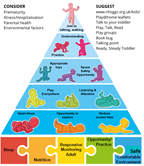 All children are different. As they grow, there will be areas of development and learning which will come more easily to them. There will be other areas of development that will be more of a challenge.
All children are different. As they grow, there will be areas of development and learning which will come more easily to them. There will be other areas of development that will be more of a challenge.
The diagram above shows that other things can affect a child’s journey. This might include:
Any of the above factors can affect the timing and path of their developmental journey.
In general, your child will benefit from being met “where they are.” Support should be given at the right time and place depending on their own unique journey. Try not to worry about their age or what other children experience. It is important to discuss your questions about your own child with your child’s health team. Here is some information that may be helpful.
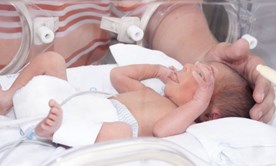 If your baby was born prematurely, i.e. before 37 weeks gestation, they are likely to follow a slightly different developmental pathway. If your baby was born less than 32 weeks gestation and you live within the NHS GG&C Health Board area, your baby will be invited to attend specialist developmental follow-up clinics. These will help to monitor their developmental progress and to offer you advice and support.
If your baby was born prematurely, i.e. before 37 weeks gestation, they are likely to follow a slightly different developmental pathway. If your baby was born less than 32 weeks gestation and you live within the NHS GG&C Health Board area, your baby will be invited to attend specialist developmental follow-up clinics. These will help to monitor their developmental progress and to offer you advice and support.
At the Developmental follow-up clinic, your baby will see a Paediatrician, Speech and Language Therapists and Physiotherapists.
It is very important when thinking about your baby’s development that you use their “corrected gestational age”. The corrected gestational age or corrected age is the age they would have been if born on their due date. For example, if your baby was born 3 months early at 28 weeks gestation, when they are 6 months old their corrected age would be 3 months.
Babies who are born early, particularly less than 32 weeks gestation, miss out on the final stage of pregnancy. This is when they would have developed a more curled up or flexed posture in the womb as they got closer to full term.
This is an important stage of pregnancy that helps babies develop their muscles particularly their tummy muscles and their pelvic and shoulder muscles as they push out against the womb and come back into a curled up or flexed position. This position of flexion is very important in developing a stable organised posture.
Premature babies can find it more difficult to use their tummy muscles to bring their arms and legs in towards their middle. Premature babies often like to be held in standing and will push back but it is important that they are encouraged to use their tummy muscles instead.
This is something you can help them with by encouraging them to bring their feet up to their hands and their hands into the middle.
 All babies should be positioned on their backs to sleep according to Safe Sleep advice.
All babies should be positioned on their backs to sleep according to Safe Sleep advice.
Click here for Scottish Government Leaflet - Reduce the Risk of Cot Death
This is also the case with premature babies. You should not use any additional positioning equipment when putting your baby into their cot to sleep.
During the day when your baby is awake, it is very important that they experience a variety of different positions to help them develop their muscles and control their movements.
Any piece of equipment where your baby is in a semi-standing position will encourage them to push up onto their toes rather than developing their tummy muscles. This can make it more difficult for them to develop their balance skills in sitting and in independent standing later on.
The development of a stable posture and the ability to be still is essential for the development of attention control, play and early communication skills.
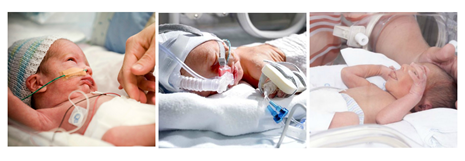
Your premature baby will benefit from regular short periods of quiet one to one play. Try to choose a time when there are no other distractions such as TV or radio in the background. Choose a toy or book to share with your baby. Try to make sure you start by getting them to look at you. Keep talking to them during the task to encourage eye contact.
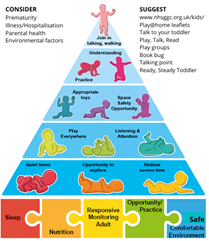 Sometimes children require extra medical care before they are sent home after birth. Sometimes they need to attend the hospital many times during their early years. Necessary medical treatments can sometimes be quite invasive and the child is not able to move and explore as freely. They may be affected by medications and therefore might be sleepier or more irritable. This is a stressful time for the whole family. It is difficult to get in fun sessions of play and learning when there are so many other pressing needs. This can have an effect on the timing of motor skill development. Your child will often continue to make progress with their motor development. This might be a little slower than the average timing of milestones. If you would like to help support your child with their motor skills look at the videos above.
Sometimes children require extra medical care before they are sent home after birth. Sometimes they need to attend the hospital many times during their early years. Necessary medical treatments can sometimes be quite invasive and the child is not able to move and explore as freely. They may be affected by medications and therefore might be sleepier or more irritable. This is a stressful time for the whole family. It is difficult to get in fun sessions of play and learning when there are so many other pressing needs. This can have an effect on the timing of motor skill development. Your child will often continue to make progress with their motor development. This might be a little slower than the average timing of milestones. If you would like to help support your child with their motor skills look at the videos above.
Some children are born with additional needs. Some parents learn of their child’s diagnosis even before their baby is born or quite soon after. However, with other children, it can take months or years to have a better understanding of why there might be differences in the child’s development. This can be very difficult for families, as expectations are unclear and it is hard to know what to do or tell others with well-meaning questions. It is helpful for you to support your child where they are, and encourage their development based on their stage and not their age or on what other children are experiencing.
Gross motor skills are the movements, positions and actions of the body. If your child is having difficulties with these, you might find the activity suggestions helpful to support your child.
Have a look at the videos and the Developmental Timeline.
Some medical conditions are well known such as cerebral palsy, or muscular dystrophy. If your child is diagnosed with these conditions, you might find these areas on the KIDS website helpful.
Some children can be diagnosed with very rare conditions that only a few people in the world might have. With increased access to genetic testing, young children with developmental delay may be diagnosed with having changes in their genetic make-up. Our DNA maps out how our body is structured and performs as we grow. Changes in our DNA can show up as changes in our ability to learn, move, and grow. Sometimes multiple areas of development are affected (learning, motor, speech and language, emotional).
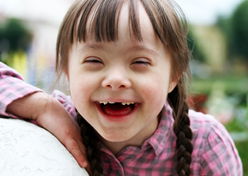 It is important to talk with your child’s health team about their specific genetic information or diagnosis. However, any two children with the same changes can develop differently. It is important to meet your child where they are and support them on their own unique developmental journey.
It is important to talk with your child’s health team about their specific genetic information or diagnosis. However, any two children with the same changes can develop differently. It is important to meet your child where they are and support them on their own unique developmental journey.
Gross motor skills are the movements, positions and actions of the body.
Having Lower Muscle Tone than Average
Having Changes in the Sensory Systems
Having Changes In The Processing Of Sensory Information
Having Learning Differences
Having Differences in Social Play or Play Skills in General
Your child’s health team will offer guidance to help you support your child with their gross motor skills. They will help you consider important factors related to your child’s movement and activity. Making activities fun and playful will help your child to practice areas that are challenging and nurture their abilities to their own unique level. There are examples of ways to bring on some of the key motor actions, such as rolling, sitting, and tummy time in the videos above.
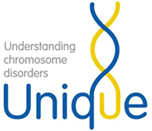 UNIQUE is a charity that provides support and information for people with and for families of children with genetic differences (particularly those that are rare).
UNIQUE is a charity that provides support and information for people with and for families of children with genetic differences (particularly those that are rare).